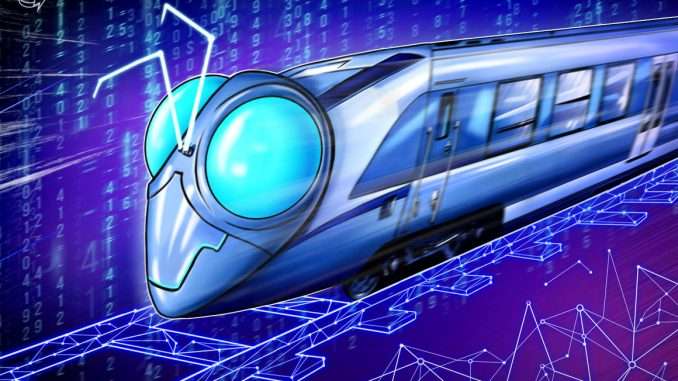
In my newest article “Crypto, like railways, is among the world’s top innovations of the millennium,” I evaluate the blockchain revolution to the railway increase. If we apply this analogy additional, what’s going to occur subsequent?
Stuart Hylton in his ebook What the Railways Did for Us: The Making of Modern Britain cites this quote: “The direct effects of railway building are, after all, considerable enough in themselves to require no exaggeration. They profoundly influenced the internal flows of traffic, the choices of the site and the patterns of land use, the residential densities and development prospects of the central and inner districts of the Victorian city.”
When one examines the growth of blockchain know-how, one could make a curious statement. First of all, no one noticed it coming: People uncared for Bitcoin (BTC) and associated functions; blockchain protocols had been doomed as pointless, whereas Wall Street predicted the fall of crypto. Laugh or not, Bitcoin has “died” over 400 instances. Secondly, the business has captivated the minds of the public and professionals, governors and creators; in a blink of an eye fixed, the internet adopted the roadmap from Web2 to Web3.
Just like railways remodeled cities in the early days, blockchain continues to form the format of the internet. Below I spotlight a few of the key methods it influences the design and structure of digital networks and bodily infrastructure.

Quasi money
The first use case of cryptocurrency is immediate, uncensored, almost free funds. The majority of crypto customers don’t care about changing the central financial institution forex of their international locations; they merely get pleasure from the seamless pace and fungibility of new cash.
Often, this digital money is accepted when there’s a limitation on the utilization or a excessive payment imposed on a standard forex. As a outcome, extra retailers think about this fee technique, whereas maintainers of crypto additionally adapt.
Related: The decoupling manifesto: Mapping the subsequent section of the crypto journey
Miners and crypto gatekeepers
Crypto infrastructure tailored to rules and vice versa. When China launched a ban on preliminary coin choices and later restricted mining in the nation, the business moved to extra favorable territories. Also, international locations with cheaper electrical energy such as Venezuela and Ukraine glad the demand in increasing mining operations.

When extra cryptocurrencies launched proof-of-stake consensus, plenty of decentralized finance (DeFi) initiatives emerged. So, whereas bankers continued their plea to neglect this “funny money,” the business strengthened its place and quietly grew to an over-$2-trillion market.
Now, I return to the chapter on city planning with railroads: “The arrival of the railroads in London, according to Simon Jenkins, had a greater impact than anything since the Great Fire of 1666.” The identical occurred to crypto for investing: Suddenly, hundreds of thousands of individuals — largely millennials — received an opportunity if to not grow to be super-rich then at the very least to make a fast buck on the launch of new tokens. This motivated blockchain entrepreneurs to construct extra DeFi options, from decentralized exchanges to farming and varied liquidity swimming pools.
Related: Building blocks: Gen Y can use tokens to get on the property ladder
NFTs and organizing the chaotic web of knowledge
If engines like google like Google allowed us to systemize info on the internet, then Web3 would make it simpler. For occasion, a sure file — let’s say, a picture — might be reused as an authentic supply as a substitute of copying it. This appears contradictory to what we observe now, however the introduction of nonfungible tokens (NFT), their gross sales frenzy and the experiments in digital actuality trace at what a “semantic web” may appear like.

Hylton mentions that railways pushed the slums out of British and American cities and introduced order to the streets alongside these rails. “By the mid-twentieth century, trains had made one final addition to the British landscape: a statewide network of sometimes abandoned and impassable canals, many of which have since been rebuilt. During the early phases of the Industrial Revolution, they served as the nation’s arteries. The Duke of Bridgewater, who created the canal that bears his name, was one of the first to see the threat that railways represented to his creation. ‘They will endure my time, but I sense trouble in those infernal tramroads,’ he observed of the canals as an elderly man (he died in 1803).”
Related: Web3 depends on participatory economics, and that’s what is lacking — Participation
Where does it lead us?
So, the railroads changed the canals. Web3 will inevitably remodel Web2, however we can’t be sure about the equity of the course of. (Similar to railroad remodeling the terrain of cities and transferring poor populations to different locations, blockchain protocols are forcing digitalization with out giving an actual alternative.) As energetic observers, it’s our responsibility and duty to consistently remind ourselves about the limitations and dangers of new applied sciences to make sure a simply transition for all.
This article doesn’t include funding recommendation or suggestions. Every funding and buying and selling transfer includes threat, and readers ought to conduct their very own analysis when making a call.
The views, ideas and opinions expressed listed below are the writer’s alone and don’t essentially replicate or symbolize the views and opinions of Cointelegraph.
Katia Shabanova is the founding father of Forward PR Studio, bringing over 20 years of expertise in implementing applications for IT firms starting from Fortune 1000 companies and enterprise funds to pre-initial public providing startups. She holds a Bachelor of Arts in English Philology and German Studies from Santa Clara University in California and earned a Master in Philology from the University of Göttingen in Germany.



